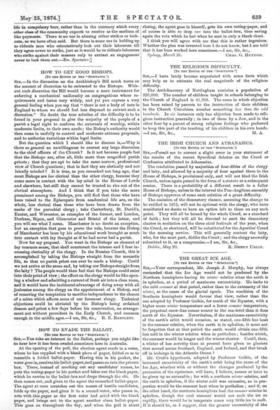HOW TO GET GOOD BISHOPS.
(To THE EDITOR OF THE .` SPEOTATOR.1
the discussion on the Archbishop's Bill much turns on the amount of discretion to be entrusted to the Bishops. With- out such discretion the Bill would become a mere instrument for enforcing a mechanical uniformity on congregations whose re- quirements and tastes vary widely, and yet you express a very general feeling when you say that "there is not a body of men in England to whom we should feel less disposed to entrust such a discretion." No doubt the true solution of the difficulty is to be found in your proposal to give the majority of the people of a parish a legal right to conform the externals of worship, within moderate limits, to their own needs ; the Bishop's authority would then come in usefully to control and moderate extreme proposals, and to authorise variations within legal limits.
But the question which I should like to discuss is,—Why is there so general an unwillingness to entrust any large discretion to the chief officers of the Church? Is it not because people feel that the Bishops are, after. all, little more than magnified parish priests ; that they are apt to take the same narrow, professional view of Church questions; that in fact they are clerically and not laically minded? It is true, as you remarked not long ago, that nsost Bishops are less clerical than the other clergy, because they -come more in contact with the lay mind in the House of Lords and elsewhere, but still they cannot be trusted to rise out of the 'clerical atmosphere. And I think that if you take the more prominent among the Bishops, you will find that those who have been raised to the Episcopate from academical life are, on the -whole, less clerical than those who have been drawn from the -ranks of the parochial clergy ; take Canterbury, St. David's, Exeter, and Worcester, as examples of the former, and London, Durham, Ripon, and Gloucester and Bristol of the latter, and you will see what I mean. Manchester is no doubt an exception, but an exception that goes to prove the rule, because the Bishop of Manchester has been by his educational work brought as much into contact with lay thought as if he had never had a pariah.
Now for my proposal. You want in the Bishops an element of lay common-sense, that shall counteract the intense and I fear in- -creasing clericality of the clergy. In the Russian Church, this is accomplished by taking the Bishops straight from the monastic life, so that no parish priest can ever be made a bishop. Could we not arrive at the same end, by taking our Bishops straight from the laity ? The people would then feel that the Bishops could enter into their point of view ; the effect on the clergy would be like open- ing a window and admitting a current of fresh air into a close room, and it would have the incidental advantage of doing away with all jealousies among the clergy on the appointment of a Bishop, and of removing the temptation to sacrifice independence to the chance of a mitre which affects some of our foremost clergy. Technical -objections could be obviated by the Bishop's being ordained deacon and prieat a few days before his consecration, an arrange- ment not without precedent in the Early Church, and common -enough in the middle ages.—I am, Sir, &c., R. E. BARTLETT.


































 Previous page
Previous page